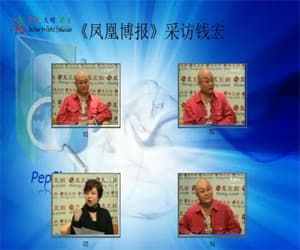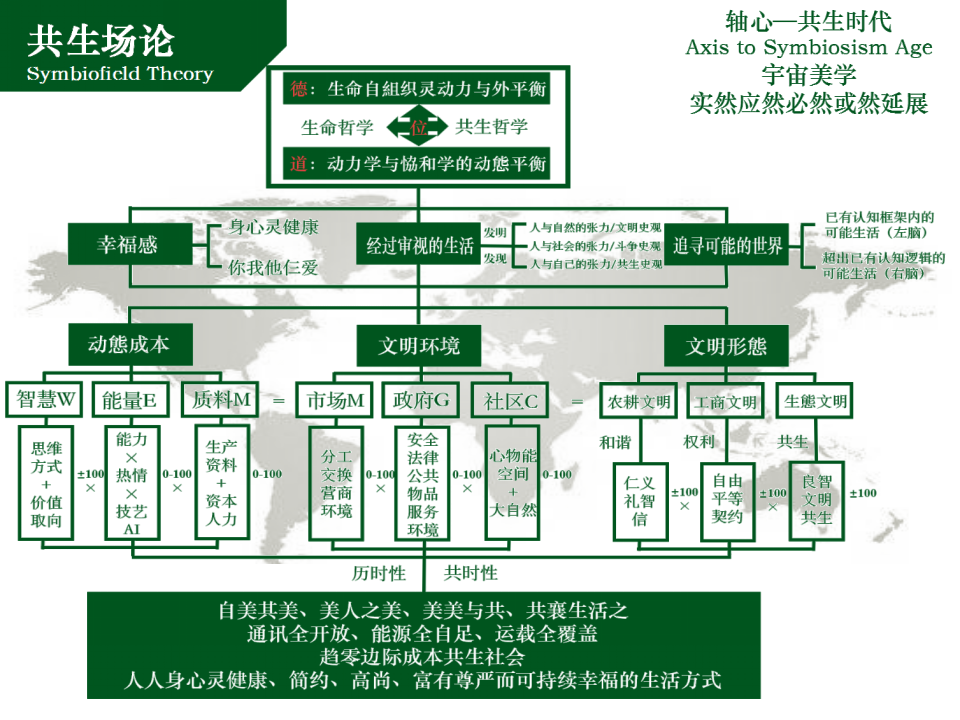New Articles
-
 AI三大瓶颈及其10个“傻白”和5个“傻精” 2026/02/04
AI三大瓶颈及其10个“傻白”和5个“傻精” 2026/02/04AI三大瓶颈及其10个“傻白”和5个“傻精”The Three Major Bottlenecks of AI and Its “10 Naïve Blind Spots” and “5 Cunnin...
-
 共生场图灵测试 (SFTT)的设计 2026/02/03
共生场图灵测试 (SFTT)的设计 2026/02/03共生场图灵测试 (SFTT)的设计Symbiotic Field Turing Test (SFTT) Design 本报告根据Google AI与Archer宏2...
-
 沃什、马斯克与钱宏 GDE 体系:把握宏观不确... 2026/02/02
沃什、马斯克与钱宏 GDE 体系:把握宏观不确... 2026/02/02沃什、马斯克与钱宏 GDE 体系:把握宏观不确定性的范式革命 Warsh, Musk, and Hong Qian's GDE System: A Paradigm ...
-
 从 GDP 到 GDE——如何切断“规模—外汇—互害”的... 2026/02/02
从 GDP 到 GDE——如何切断“规模—外汇—互害”的... 2026/02/02从 GDP 到 GDEFrom GDP to GDE——如何切断“规模—外汇—互害”的制度循环?How to Cut the Institutional Loop of “S...
共生思想理论前沿
THE THEORY
-

-

-

-
 关于中文“共生”翻译及对应的人、事、物之说明
关于中文“共生”翻译及对应的人、事、物之说明关于中文“共生”翻译及对应的人、事、物之说明 ——Symbiosism:Charles Thomas Taylor &Qian hong又一次量子缠绕...
查看详细说明
Speech
-
 三大自组织货币的共生格局——宏观世界之数字货币 2021/07/08
三大自组织货币的共生格局——宏观世界之数字货币 2021/07/08三大自组织货币的共生格局 ——宏观世界之数字货币 钱 宏 The Institute for Global Symbiosism(...
-
 新汉字yǜ的释义 2019/11/16
新汉字yǜ的释义 2019/11/16语从金音玉(Yǜ):金口玉言,一诺千金,性人诚恳、执信; &n...
-
 钱宏:中国的真实经验与未来走向(凤凰博报专... 2019/11/16
钱宏:中国的真实经验与未来走向(凤凰博报专... 2019/11/16点击播放 中国的真实经验与未来走向《凤凰博报》专访钱宏主持人:...
从川普总统推特治世到全球格局的哲学新范式
发布时间:2025/02/17 公司新闻 浏览次数:256
从川普总统推特治世到全球格局的哲学新范式
——兼论生态战争的熵增逻辑与逆熵出路
By Archer Hong Qian
引言:川普推特治世与传统政治逻辑的瓦解
川普第一任期内的国家安全顾问 约翰·博尔顿(John Bolton) 近日接受《法兰克福汇报》专访时表示:“川普周围一团糟,他上任后的一系列举措看不出有任何战略意图。”
但我不这样看。川普的推特治世(Twitter Governance)可以用《红楼梦》里的两句互文来描述:
- “世事洞明皆学问,人情练达即文章”(Insight into worldly affairs is knowledge; mastery of human nature is literature.)
- 案例:川普并不依赖传统官僚体系,而是通过 社交媒体操控(Social Media Manipulation) 影响舆论。例如,明明已有 《美加墨自由贸易协定》(USMCA),他却扬言要对 加拿大和墨西哥加征 25% 关税,以此激励两国加强边境管理,阻止非法移民、芬太尼走私,并限制第三国的转口贸易。表面上,这似乎是单边主义的经济胁迫,实则是他 巧妙利用贸易作为外交工具,迫使相关国家承担更大责任,实现双赢。
- “假作真时真亦假,无为有处有还无”(When false is taken as true, true becomes false; where nothing exists, something emerges.)
- 案例:川普的某些外交言论,乍看之下 荒诞无理,实则隐藏战略意图。例如,为了 刺激欧洲、日本、韩国提高国防预算,他提出一系列看似矛盾的言论:
- 声称要取消对乌克兰的援助;
- 但又表示乌克兰的稀土资源至关重要,暗示可能派兵乌克兰以保护资源安全。
- 案例:川普的某些外交言论,乍看之下 荒诞无理,实则隐藏战略意图。例如,为了 刺激欧洲、日本、韩国提高国防预算,他提出一系列看似矛盾的言论:
这些言论表面上让人疑惑:“他要出卖乌克兰吗?”但细究之下不难发现,这恰恰是他的战略手法——欧洲如果意识到美国可能减少援助,就必须自主增强军事实力,以确保自身安全。否则,如果川普真的出卖乌克兰,他为什么还要推动欧洲国防预算提高到 GDP 5%?他疯了吗?当然没有,他只是在塑造某种国际政治格局的 战略平衡。
川普的种种“不可理喻”的言行,实际上是在重新塑造一种交互主体共生(Intersubjective Symbiosism) 的国际政治格局,即 不以单一国家利益为中心,而是通过各方博弈,使整体体系向更高效、更趋“交相利,兼相爱”的共生模式演进。
一、传统政治逻辑的局限性:主客二元结构(Subject-Object Dualism)的惯性陷阱
人类政治思维的底层结构,建立在“主体—客体”(Subject-Object)二元对立之上。这一逻辑的核心特征是:
- 主体自居(Subject-Centeredness)
无论个人、群体、民族、国家、文明等,本质上都是以某个特定群体为“主体”, 把他者视为“客体”,将他们边缘化、工具化,以便加以支配、改造、操纵、利用。
- 例子:国家主义(Statism)观念下,热战、冷战(Cold War)思维,导致诸多主权与人权的冲突。极端民族主义(Ultra-Nationalism),以种族优越论支配他者,德国的“雅利安人优先”(Aryan Supremacy),导致大规模种族清洗(Holocaust),日本的“东亚共荣圈”(Greater East Asia Co-Prosperity Sphere)试图奴役东亚各国,将其经济、资源、人力完全服务于日本的帝国扩张。精英主义(Elitism)、民粹主义(Populism),“富人革命” vs. “穷人革命”,传统的革命往往是富人精英鼓动底层 进行暴力或高昂代价的改朝换代(如法国大革命、俄国革命),而最新版的富人革命(Elite-Led Reform) 采取了不同方式:米莱(Javier Milei,阿根廷总统)、川普(Donald Trump)、马斯克(Elon Musk):富人亲自入场,通过最低成本和高效率的体制革新,绕过传统政治势力,直接推动变革。
2.权力—控制结构(Power-Domination Structure)
- 这种二元政治思维导致的结果,是不断的权力竞争、冲突、控制、征服。
- 例子:冷战格局、霸权政治、殖民历史、经济制裁、科技封锁,都反映出“谁是主体、谁是客体”的争夺。
这些案例表明,新时代的政治变革,不再是单纯的主客对立,而是向着交互主体共生转变。
3.真理唯一论(Absolute Truth Paradigm)
- 传统政治逻辑往往认为,某种意识形态、文化、道德体系必须凌驾于其他体系之上,而非相互融合、共生。
- 例子:资本主义 vs. 社会主义、西方自由主义 vs. 东方威权主义、市场经济 vs. 计划经济,这些对立的二元框架导致长期的社会撕裂和国际冲突。这种二元政治思维导致的结果,是不断的权力斗争、冲突、控制、征服。
这一整套逻辑在现代社会仍然广泛存在。在全球范围内,国家之间、经济体之间、文化体系之间,仍然在重复着类似的主客对立游戏。而且,中国人的历史文化经验中,无论是以《道德经》式的狡黠(柔道权谋)、《孙子兵法》式的算计(战争战略)、《礼记》式的藏小(等级秩序)、《商君书》式的驭民(法律统治)、《净土》式的方便法门(宗教权谋)、《俄共(布)党史》+“替天行道”式斗争(革命意识形态),还是文革+改革“双革”思维(破旧立新),也充满了二元对立的自我中心主义思维。
二、超越主客对立:交互主体共生思维(Intersubjective Symbiosism)
川普的推特治世展现出的,不只是一个混乱的政治风格,而是一种 交互主体共生场(Intersubjective Symbiosism)的现实映射——“众声喧嚣未必是坏事,反而能促进事情变得明晰”。
1.当我们不再用传统二元对立的方式去理解世界,而是承认不同主体的交互性、共生性、流动性,就能够避免陷入以自己为主体、将他者工具化的惯性思维,转而进入一个更开放、动态的世界观。
2.战争的本质是生态冲突(Ecological Conflict),比如俄乌战争,传统认知:地缘政治对抗(Russia vs. NATO);交互主体共生思维:能源结构转型、信息认知战、国家身份认同冲突的综合体;解决方案:超越胜负思维,以多主体协作(信息+经济+社会)寻求动态平衡。
- 交互主体共生的技术伦理框架
- 金律(Golden Rule):待人如己,推己及人(Do to others as you would have them do to you),促进共情与理解
- 银律(Silver Rule):己所不欲,勿施于人(Do not impose on others what you yourself do not desire),避免伤害与剥削
- 铜律(Bronze Rule):己之所欲,乐施于人(To give joy to others as one desires for oneself),鼓励积极合作
- 铁律(Iron Rule):以眼还眼,以牙还牙(An eye for an eye, a tooth for a tooth),制衡权力滥用,维持公平与公义
- 通律(General Rule):自己活也要别人活,不要自己邪恶也让别人邪恶(Live and let live; don’t be evil and let evil be),共存伦理
三、未来世界的确定性——爱之智慧孞態网(Amorsophia MindsNetwork)
生命:自组织连接创新平衡,改写自然熵增定律,为“熵增-熵减-熵旋定律”,宇宙历时性缘起到生命共时性起源;孞念:愛之智慧历时又共时地贯通质能信、身心灵、精气神,改变世界;健康:细胞-个体-群体-共同体交互主体意识的觉醒-睡觉-修复(端粒活性-线粒体电力-细胞膜电压),物理-生理-心理-伦理-数理-天理的历时性与共时性交互共生;医疗:樂、砭、針、灸、藥、孞的历时性与共时性应用,孞念的技术呈现与伦理阈值,置于一套轻巧、舒适、美观的可穿戴衣饰(设备),联通爱之智慧孞联网,实现生物智能与人工智能交互主体共生。
在交互主体共生哲学(Intersubjective Symbiosism)的语境下,一种类似于“时空光波感应”技术以其量子信息场的核心机制,揭示了生命与健康的“共生场效应”——一种基于全息连接、动态平衡和意义赋能的系统互动模式。这种效应不仅重新定义了生命的本质、孞念的价值和健康医疗的可能性,也为构建愛之智慧孞联网(Amorsophia MindsNetworking)提供了现实路径。
“爱之智慧孞態网”将通过 AI 和 Web3 技术,实时感应人类行为的真伪、善恶、美丑、智慧愚昧,帮助全球治理建立动态平衡机制。直指“一念天堂,一念地狱”(One Mind Heaven, one mind Hell)问题。
1.核心机制:“开心(喜乐)机制”(Joy Regulation Mechanism)
- 通过 AI 监测人类 每一念 的真伪、善恶、美丑、智慧愚昧
- 赋予个体在 社会、政治、经济、文化 中的实时行为调整反馈
- 实时运行机制:感应个体/社会系统的偏差,进行动态平衡修正
- 社交网络:防止信息污染,形成“真伪-信任评分”
- AI伦理:确保 AI 决策符合人类伦理标准(如智能医疗、公平金融)
- 全球治理:基于 Web3 DAO 结构,建立跨国信任机制
- 通过 AI和 监测个体情绪,提供正向引导。
- “共生币”(Symbiotic Token, SBT)机制:共生行为(环保、志愿服务、创造力)获得奖励。
- 保障个体与共生体的自组织连接动态平衡(Self-Organizing Balance)
- 通过 AI + Web3 形成全球信任系统,实现个体自由选择与社会最优治理的结合。
- 参考地球世:愛之智慧孞態网(Earthropocene: Amorsophia MindsNetwork),http://symbiosism.com.cn/9348.html
结论就是:确保生态文明共生场的实现
- 传统的政治逻辑基于二元对立、权力争夺、主客之分,而这一模式在信息时代、人工智能革命、生态危机加剧的今天已不再适用。交互主体共生思维 提供了一条新的路径,让人类社会能够走出熵增的混沌,迈向真正的全球共生。
- 唯有超越主客对立,依托 AI、伦理、制度的结合,才能实现真正的全球共生。“爱之智慧孞联网”技术伦理基础设施,实时优化个体-社会-全球治理的动态平衡,避免认知撕裂、生态崩溃、战争熵增,为人类社会的和平共存、认知协同和生态治理提供可能的出路——确保生态文明共生场的实现。
最后,说说万斯副总统到慕尼黑会议上的发言
刚好看过美国之音对万斯慕尼黑演讲的同声翻译。
万斯副总统(著有畅销书《乡下人的悲歌》)这次在老欧洲强调言论自由与民主价值的意思,不是泛泛而谈,而是针对政府包揽(代表)行为,不但替代不了公民个人改变命运和生活方式的创新和再选择,而且会扼杀人及整个社会的生命自组织平衡活力!
这就有了全新的哲学意义——政府强权特权Trust系统以Subject自居視人民和世界为Object的自我中心主义(包括人本主义、各种排他性的共同体与所谓“战略合作伙伴”),在AI时代已经走到其阈值尽头,再不改弦更张进入Intersubjective Symbiosism(多元主体共生)新世界格局,欧洲乃至整个世界,将面临从内到外的系统性崩塌的危险‼
川普让万斯到慕尼黑讲话,不是傲慢,是作为美国合法移民第二代成功典范的楞劲儿强,他和马斯克(第一代移民)都是有大情怀的人,但他们不能忘却美国真的是“We the People”的美国(我这五年来近距离观察,去年大选还特地跑了四个州),他只有四年时间,不能再多,川普的MAGA运动(包括他选择《乡下人的悲歌》作者年轻人万斯作副总统),绝对玩不了假,他既要承担国际责任,又不能让美国人民感到吃亏——承担国际责任是值得的。他是真心希望欧洲自强(自组织连接)起来,才不老成世故地指出:欧洲的问题不要外部(中国或俄罗斯),而在内部,这种冒犯欧洲国家众怒的话,要多大勇气才敢于说出来啊——一个细节是,在万斯讲话博得第一次掌声后,他轻轻就了一句“我希望我后面的讲话,也能得到在座的大家的掌声”,我当时就感到,他完全意识到接下来的话,可能不中听,但他依然鼓起勇气把话说了出来(这看起来确实比较幼稚)!
川普再次当选后发布了20个核心承诺,他必会兑现。他确实有天真的一面,但是,世人对川普,切忌将个人行为和国际行为对立起来评论这位特立独行的美国总统。
我要说的是,在处理国际事务上,川普也是贯通这个美国宪法原则,俄乌战争只能以“第三条道路”结束,不管川普是否真的具有“联俄抗中”的印太意图,都会万变不离其宗。
2025年2月16日 温哥华开关居
请参看《重申“终结乌克兰战争的第三条道路”Reaffirming “The Third Path to Ending the War in Ukraine”——写于英国主持的50国防长拉姆施泰因会议援乌会议与美、俄、乌三国总统通话之后— Written After the U.S.-Led 50-Nation Ramstein Aid Conference for Ukraine and the U.S.-Russia-Ukraine Presidential Calls》http://symbiosism.com.cn/9487.html
From President Trump’s Twitter Governance to a New Philosophical Paradigm of the Global Order
— Also Discussing the Entropic Logic of Ecological Warfare and the Path to Negentropy
By Archer Hong Qian | February 16, 2025, Vancouver Kaiguanju
Introduction: The Disruption of Traditional Political Logic by Trump’s Twitter Governance
John Bolton, former National Security Advisor during President Trump’s first term, recently stated in an interview with Frankfurter Allgemeine Zeitung:
“Trump’s administration was a mess. I don’t see any strategic intent behind his actions during his presidency.”
I do not share this view. Trump’s Twitter Governance can be aptly described by two intertextual quotes from Dream of the Red Chamber:
“Insight into worldly affairs is knowledge; mastery of human nature is literature.” (世事洞明皆学问,人情练达即文章)
- Example: Trump did not rely on the traditional bureaucratic system but instead influenced public opinion through Social Media Manipulation. For example, despite the existence of the United States-Mexico-Canada Agreement (USMCA), he threatened to impose a 25% tariff on Canada and Mexico. This move was not mere economic coercion but rather a calculated diplomatic tool to push these countries to take greater responsibility for border control, curbing illegal immigration, fentanyl smuggling, and transshipment trade from third countries. At first glance, this seemed like unilateral economic pressure, but in reality, it was a strategic maneuver to achieve a win-win outcome.
“When false is taken as true, true becomes false; where nothing exists, something emerges.” (假作真时真亦假,无为有处有还无)
- Example: Some of Trump’s diplomatic statements may appear irrational but, in fact, conceal strategic intentions. For instance, to pressure Europe, Japan, and South Korea into increasing their defense budgets, he made a series of seemingly contradictory statements:
- He claimed he would cut aid to Ukraine;
- Yet, he also emphasized the strategic importance of Ukraine’s rare earth resources, implying a potential deployment of U.S. troops to protect resource security.
On the surface, one might ask: “Is Trump betraying Ukraine?” But upon closer analysis, his true intention becomes clear—if Europe believes U.S. support is uncertain, it will be forced to enhance its own military strength to ensure its security. Otherwise, if Trump were genuinely abandoning Ukraine, why would he push for European defense budgets to reach 5% of GDP? Is he crazy? Of course not. He is strategically reshaping the global balance of power.
- Example: Some of Trump’s diplomatic statements may appear irrational but, in fact, conceal strategic intentions. For instance, to pressure Europe, Japan, and South Korea into increasing their defense budgets, he made a series of seemingly contradictory statements:
Trump’s seemingly “irrational” statements and actions are actually redefining the structure of the global order through Intersubjective Symbiosism. Instead of prioritizing the national interests of a single country, he is leveraging multilateral dynamics to drive the system toward a more efficient and mutually beneficial model—a world order based on mutual prosperity and interconnected benefits.
I. The Limitations of Traditional Political Logic: The Inertia of Subject-Object Dualism
The foundation of human political thought has long been built upon the Subject-Object dualism—the division between those who govern and those who are governed. This logic is characterized by three core features:
1. Subject-Centeredness
Be it individuals, groups, nations, or civilizations, all tend to position themselves as the “subject” while reducing others to “objects”—marginalizing, instrumentalizing, and dominating them.
- Examples:
- Statism: Cold War politics, leading to conflicts between sovereignty and human rights.
- Ultra-Nationalism:
- Germany’s “Aryan Supremacy” led to the Holocaust.
- Japan’s “Greater East Asia Co-Prosperity Sphere” aimed to enslave East Asian nations, exploiting their economies, resources, and labor for imperial expansion.
- Elitism vs. Populism:
- Traditional revolutions: Elites incite the lower class to violently overthrow regimes, resulting in high-cost power shifts (e.g., the French Revolution, Russian Revolution).
- New model of Elite-Led Reform: Leaders such as Javier Milei (Argentina), Donald Trump (U.S.), and Elon Musk personally engage in political and economic restructuring, bypassing traditional bureaucratic forces to implement reforms with minimal cost and maximum efficiency.
2. The Power-Domination Structure
This dualistic mindset inevitably leads to competition for control, conflicts, and subjugation.
- Examples:
- Cold War tensions, power struggles, economic sanctions, technological embargoes.
- Bipolarity in geopolitics, where dominant nations fight to assert supremacy.
3. The Absolute Truth Paradigm
Traditional politics assumes that a single ideology, culture, or moral system must prevail over others, rather than allowing for coexistence and mutual benefit.
- Examples:
- Capitalism vs. Socialism,
- Western liberal democracy vs. Eastern authoritarianism,
- Market economy vs. Planned economy—all leading to prolonged social division and international disputes.
This binary thinking continues to shape modern society. China’s historical political culture, too, reflects dualistic self-centered thinking:
- Taoist Machiavellianism (Dao De Jing‘s cunning governance),
- Sun Tzu’s strategic deception,
- Confucian hierarchy and social stratification,
- Legalist authoritarianism,
- Revolutionary struggle ideology,
- Maoist Cultural Revolution and post-reform economic pragmatism—all of which reinforce subject-object dichotomy.
II. Transcending Dualism: The Philosophy of Intersubjective Symbiosism
Trump’s Twitter Governance is not just a chaotic political style—it is an empirical reflection of Intersubjective Symbiosism—an interactive, symbiotic, and dynamic reality where the cacophony of multiple voices clarifies issues rather than obscuring them.
Key Principles:
- Abandon the traditional dualistic worldview and acknowledge the interconnected, symbiotic, and fluid nature of subjects.
- War as an Ecological Conflict (e.g., Russia-Ukraine War):
- Old view: A geopolitical clash (Russia vs. NATO).
- New view: A complex system involving energy transitions, information warfare, and national identity conflicts.
- Ethical Framework for Symbiosis:
- Golden Rule: Treat others as you would like to be treated.
- Silver Rule: Do not impose on others what you do not desire for yourself.
- Bronze Rule: Share joy with others as you desire for yourself.
- Iron Rule: Justice requires consequences (eye for an eye).
- General Rule: Live and let live; do not propagate evil.
III. The Certainty of a Symbiotic Future—Amorsophia MindsNetworking
The Amorsophia MindsNetworking project envisions a self-organizing, dynamic equilibrium that transforms entropy-based disorder into symbiotic intelligence.
Core Mechanisms:
- Joy Regulation Mechanism (AI-monitored emotional balance).
- Symbiotic Token (SBT)—a blockchain-based incentive system rewarding environmental actions, volunteerism, and creative contributions.
- Self-Organizing Balance—an AI + Web3 model ensuring decentralized, ethical global governance.
Conclusion: The Certainty of a Symbiotic Civilization
Traditional dualistic political thinking is becoming obsolete in the era of AI, information warfare, and ecological crises. The symbiotic model offers a structured pathway out of entropic chaos into a truly global, interconnected civilization.
Trump’s MAGA movement and his geopolitical strategy are deeply aligned with the constitutional principles of “We the People.” The Russia-Ukraine war can only be resolved through a “Third Path”, and the global order must embrace Intersubjective Symbiosism or risk systemic collapse.
Final Thoughts: Vice President J.D. Vance’s Speech at the Munich Conference
I happened to listen to the Voice of America’s live translation of Vice President J.D. Vance’s speech in Munich.
As the author of the best-selling book Hillbilly Elegy, Vance’s emphasis on free speech and democratic values in “Old Europe” was not just rhetoric. His remarks were not about abstract principles, but rather a direct critique of government overreach and centralized control—where state intervention cannot replace individual agency in shaping one’s destiny, nor can it substitute for personal innovation and choice in life.
More critically, Vance warned that excessive government control stifles not only personal freedoms but also the self-organizing balance of an entire society.
This raises a profound philosophical issue:
- A government based on entrenched power and privilege (the Trust System) that positions itself as the “Subject” while viewing its people and the world as “Objects” is fundamentally self-centered authoritarianism.
- This includes humanism taken to an exclusionary extreme, as well as exclusive communities and so-called “strategic partnerships” that operate under a zero-sum logic.
- In the AI era, this Subject-Object paradigm has reached its limit—if nations fail to pivot toward Intersubjective Symbiosism (a new global order based on multi-subject symbiosis), then Europe—and indeed the entire world—faces the risk of systemic collapse from within.
Trump’s Decision to Send Vance to Munich: Not Arrogance, but a Bold Statement
Trump sending J.D. Vance to Munich was not an act of arrogance—it was a deliberate move to highlight an American success story: a second-generation immigrant who defied the odds.
Both Vance and Musk (a first-generation immigrant) embody grand visions, but they must never forget that America is truly a “We the People” nation.
Having closely observed American politics over the past five years—including traveling to four states during the last election—I can confidently say that Trump only has four years. No more.
His MAGA movement—including the choice of J.D. Vance as his running mate—is not a façade. Trump must balance international responsibility with domestic accountability. He cannot afford to make Americans feel like they are losing out—but at the same time, he understands that taking on global responsibilities is worthwhile.
Trump genuinely hopes for a strong, self-organizing Europe. That is why he boldly pointed out that Europe’s core problems do not stem from external threats (China or Russia) but from within.
To say something that would inevitably provoke the anger of European leaders requires immense courage.
A small but telling moment occurred during Vance’s speech:
- After receiving his first round of applause, he softly added,
“I hope my next remarks will also receive your applause.”
At that moment, I realized:
- He knew exactly what was coming next—his words might not be well received.
- But he still had the courage to say them anyway.
It may have seemed naïve, but in reality, it was a rare display of political sincerity.
Trump’s Second Term and His 20 Core Commitments
After winning re-election, Trump laid out 20 core commitments—and he will fulfill them.
Yes, Trump does have a certain naivety, but people must avoid interpreting his personal behavior and his international actions as contradictions.
The “Third Path” to Ending the Russia-Ukraine War
In international affairs, Trump operates in full alignment with the fundamental principles of the U.S. Constitution.
There is only one viable outcome for the Russia-Ukraine war—a resolution through the “Third Path”.
Whether Trump genuinely intends to “ally with Russia against China” in the Indo-Pacific is not the key issue—his strategic approach will always be guided by the same foundational principles.
For further insights, refer to:
👉 “Reaffirming The Third Path to Ending the War in Ukraine”
http://symbiosism.com.cn/9487.html
文章中各引用资料提供简单描述,方便读者快速了解其主要内容和意义:
- 来自一篇博客文章,由孞烎(Archer Hong Qian)撰写,主要探讨了“交互主体共生”这一理念如何突破传统二元对立,主张在多主体交互中构建新的认知和治理模式。
- 这篇论坛帖子讨论了交互主体共生在现实中的应用,强调通过平等、开放的主体互动,打破以“自己”为中心的局限,从而推动社会和全球治理的转型。
- 这条推文由钱宏发布,题为“TimeWaver与共生场效应的哲学探索”,探讨了共生场效应在健康与医疗领域中的应用,展示了交互主体共生思想在技术伦理层面的实践探索。
- 来自万维论坛的一篇讨论帖,题为“从平等主体承诺,到交互主体共生”。文章从平等主体的基本承诺出发,探讨如何通过跨主体的交互共生实现社会和谐,并对国家治理和国际关系提出了新的思考方向。
- 这篇学术论文以梅洛–庞蒂的思想为核心,讨论了他关于身体中介化的交互主体性理论。文章阐释了如何通过知觉与语言的交织理解人与自然、人与人之间的共生关系,为交互主体共生提供了坚实的哲学基础。
读者朋友可以通过以上简要描述,更直观地了解各引用资料的主要观点和论述内容,无需额外查证原文,即可把握本文讨论的理论脉络和思想来源。













您好!请登录
已有0评论
购物盒子